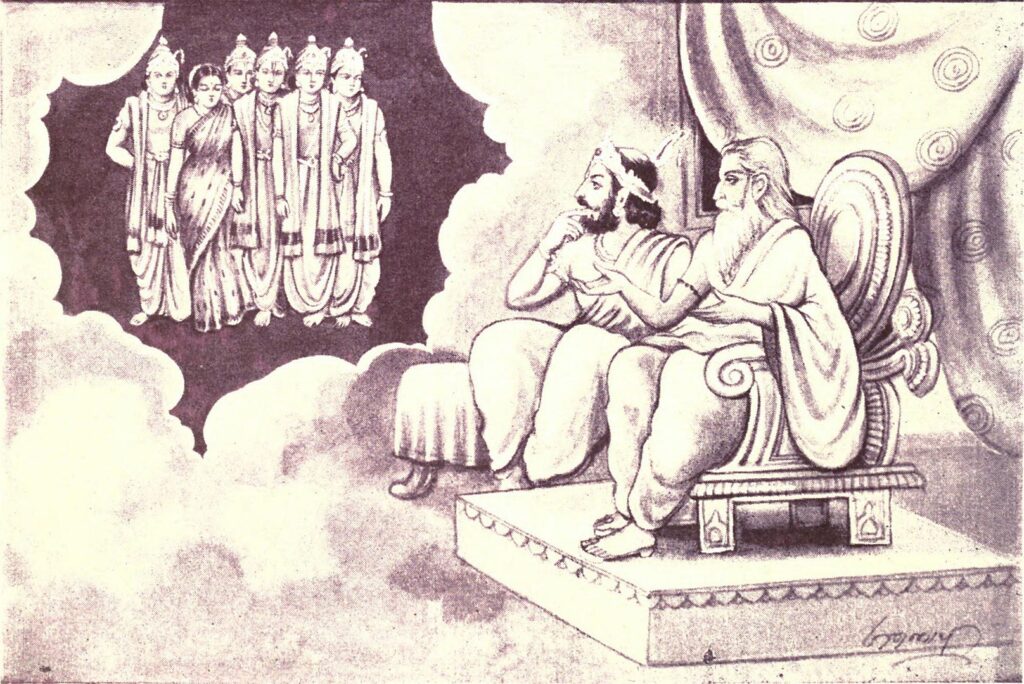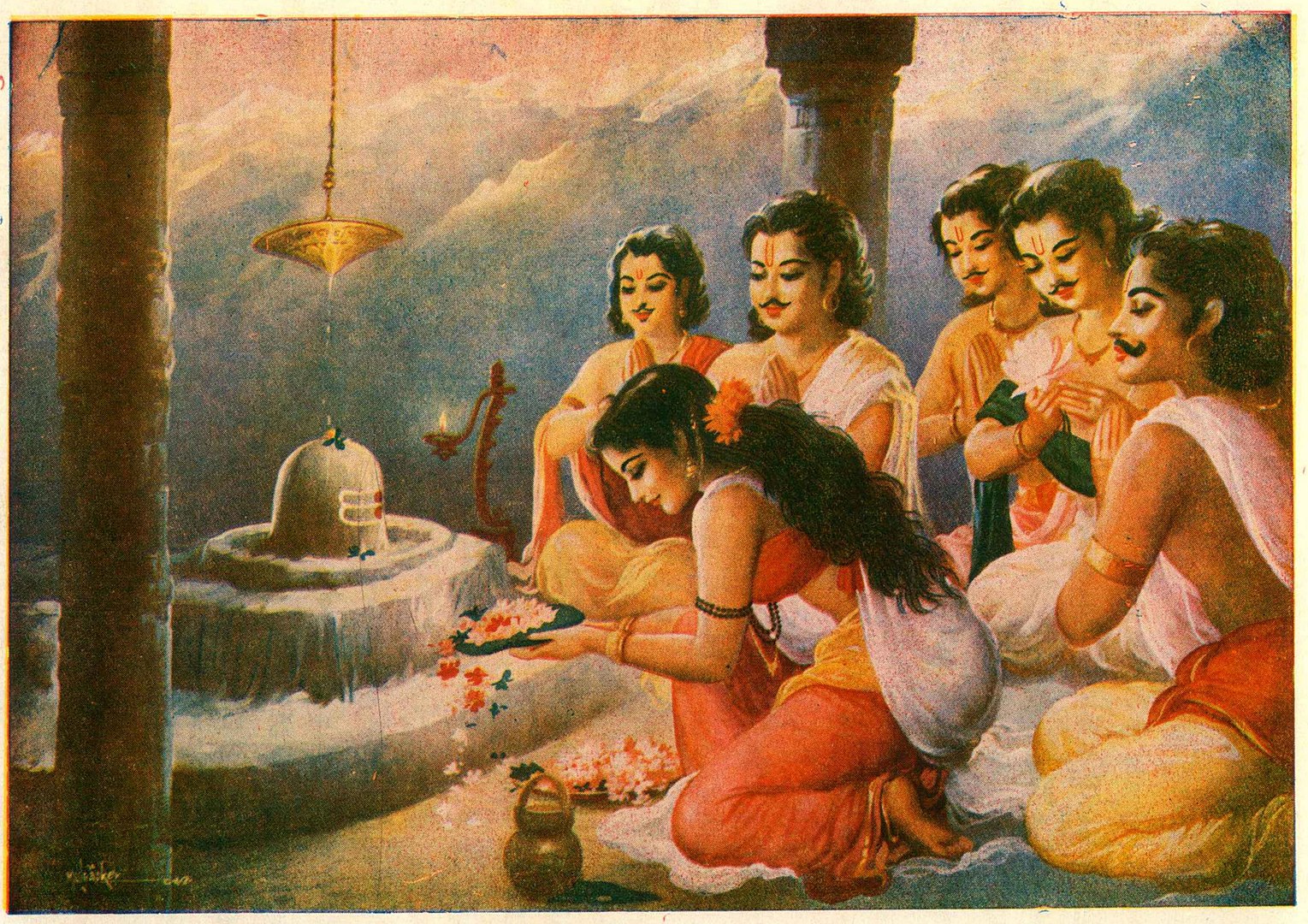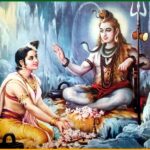Who Was Draupadi in Her Celestial Form?

Introduction
Most people know Draupadi as King Drupada’s daughter, the wife of the five Pandavas, and the queen who was wrongfully insulted in the Hastinapura court.
Some people also believe her to be a revengeful queen who caused the war at Kurukshetra.
However, there is much more to Draupadi than what we commonly know from the abridged versions and retellings of the Mahabharata. One of those is her celestial identity.
Let me tell you the story of who Draupadi was in the celestial regions. We may even call this her higher and more authentic identity.
This story is narrated in the Adi Parva (Vaivahika Parva subsection) by Ved Vyasa to Draupadi’s father, King Drupada.
The Time When Humans Became Immortal
In the days of yore, long before the birth of the Pandavas, there was a time when humans became immortal. They stopped dying because the celestials were performing a grand sacrifice in the Naimisha forest, and Yama, being busy with the sacrifice, had no time to take human lives. Consequently, the human population on earth started to increase.
This became a matter of huge concern for the celestials. Vexed by the fact that humans had become immortal, they decided to approach Lord Shiva to voice their concerns. However, Lord Shiva couldn’t understand their fear. The celestials were already immortal. Why then, was human immortality of any threat to them?
This is what they said when questioned by Lord Shiva.
“The mortals have all become immortal. There is no distinction now between us and them. Vexed at the disappearance of all distinction, we have come to thee in order that thou mayest distinguish us from them.”
The celestials to Lord Shiva
The celestials wanted the distinction between them and humans to continue. They wanted to maintain their superiority.
Lord Shiva smiled and told them that human immortality was temporary because Yama was busy with the sacrifice. Everything would return to normal after the sacrifice, he assured.
The Golden Lotuses
Relieved by Lord Shiva’s words, the celestials returned to the ongoing sacrifice by the banks of the Ganges. Very soon, they noticed a golden lotus being carried downstream by the river’s current. They marveled at the lotus and saw it flow by with the river’s current, and just as they were about to return their attention back to the sacrifice, they saw another lotus and then another, followed by even more lotuses. The celestials were awed by the beautiful lotuses and wondered where they came from. Piqued with curiosity, Indra decided to go up the river to find the origin of the lotuses.
Indra’s journey up the river led him to the very source of the Ganga, where he saw a beautiful maiden who shone like the sun. She stood there weeping a constant stream of tears. When her tears touched the water of the Ganges, they instantly became golden lotuses.
Concerned about the maiden’s grief, Indra walked up to her and asked why she was crying. Instead of answering his question, the maiden asked Indra to follow her. She took him to a place in the Himalayas, where Indra saw a handsome young man engrossed in a game of dice with a beautiful young lady. Both were seated on thrones placed on one of the Himalayan peaks. Assuming the young man to be the reason for the maiden’s grief, Indra called out to him and said:
Know, intelligent youth, that this universe is under my sway.
— Indra to the young man playing dice
However, the young man was so engrossed in his game that he didn’t even move his eyes, let alone his face. This impudence infuriated Indra and he thundered repeatedly at the youth as if to warn him:
“I am the lord of the universe!”
— Indra to the young man playing dice
The young man remained unperturbed by Indra’s words. He simply smiled and cast a sideways glance. However, this was no ordinary glance. It held within it the fire and fury of the universe. It terrified Indra so much that he froze on the spot. Unable to move, Indra stood there like a staff.
After the game of dice ended, the young man — who was none other than Lord Shiva — addressed the weeping woman and asked her to bring Indra to him.
“Bring Sakra hither, for I shall soon so deal with him that pride may not enter his heart.”
— Lord Shiva to the weeping maiden
But the weeping woman was no ordinary maiden. She was the great goddess Devi Adi Para Shakti herself. When the goddess touched Indra, he collapsed on the ground, as if paralyzed, like a piece of cloth falling on the floor. Lord Shiva looked at Indra and thundered!
Act not Sakra, ever in this way again.
— Lord Shiva to Indra
Lord Shiva Orders Indra to Enter a Cave
After uttering these words, Lord Shiva commanded Indra to enter a nearby cave and see for himself what his future had in store. In the cave, Indra saw four other devas (celestial beings) like himself. They had once been great and powerful but were now in a wretched and pitiable state.
Indra cowered with fear. He folded his hands to the great lord and begged forgiveness, but Lord Shiva shut him with these words:
“Those that are of disposition like thine never obtain my grace. These others had at one time been like thee. Enter thou this cave, therefore, and lie there for some time. The fate of you all shall certainly be the same. All you will have to take birth as humans. After achieving many difficult feats and slaying a large number of humans, you will return to the celestial region.”
— Lord Shiva to Indra
It was clear to the five Indras they would have to be reborn on earth to fulfill their destiny before they could return to the celestial regions. Lord Shiva always meant what he said. Resigning to their fate, they folded their hands and requested Lord Shiva that they be born on earth through celestial fathers.
“We shall go from our celestial regions even unto the region of men where salvation is ordained to be difficult of acquisition. But let the gods Dharma, Vayu, Maghavat, and the twin Aswins beget us upon our would-be mother.”
— The five Indras to Lord Shiva
The current Indra (Maghavat) requested Lord Shiva that instead of being born on earth, he would create a fifth person through a portion of his energy. This person would fulfill all the tasks that Lord Shiva had ordained.
Shiva agreed to all these requests and asked Devi Adi Para Shakti to also be reborn as the wife of the five Indras (to play a part in the events that had to occur on earth before it entered the new era called Kaliyuga, or the age of darkness).
Many years later, the five Indras were born as the five Pandavas, and Devi Adi Para Shakti, as Draupadi.
Ved Vyasa Grants Divine Sight to King Drupada

After enlightening King Drupada about his daughter’s celestial identity and explaining how the threads of destiny had come together in this life leading Draupadi to marry the five Pandavas, Vyasa granted divine sight to Drupada so he could see his daughter and the Pandavas in their celestial splendour.
When King Drupada saw Draupadi and the five Pandavas as celestial beings, shining the like the sun, noble, splendid, decked with beautiful jewels and celestial garments, he was awestruck and he wondered about how the divine forces worked on earth through deep disguise.
Interesting Facts
Have you ever wondered if India has any temples dedicated to Draupadi? According to this TOI article, there are close to 800 temples dedicated to Draupadi Amman in the states of Tamil Nadu, Andhra Pradesh, Telangana, Karnataka, and Kerala.
Her temples are usually small and situated in remote places. Devi Draupadi or Draupadi Amman is worshipped as the village deity (Gram Devi) as well as the family deity (Kula Devi) in these places. The villagers pray to her for protection, rain, and good crops.



